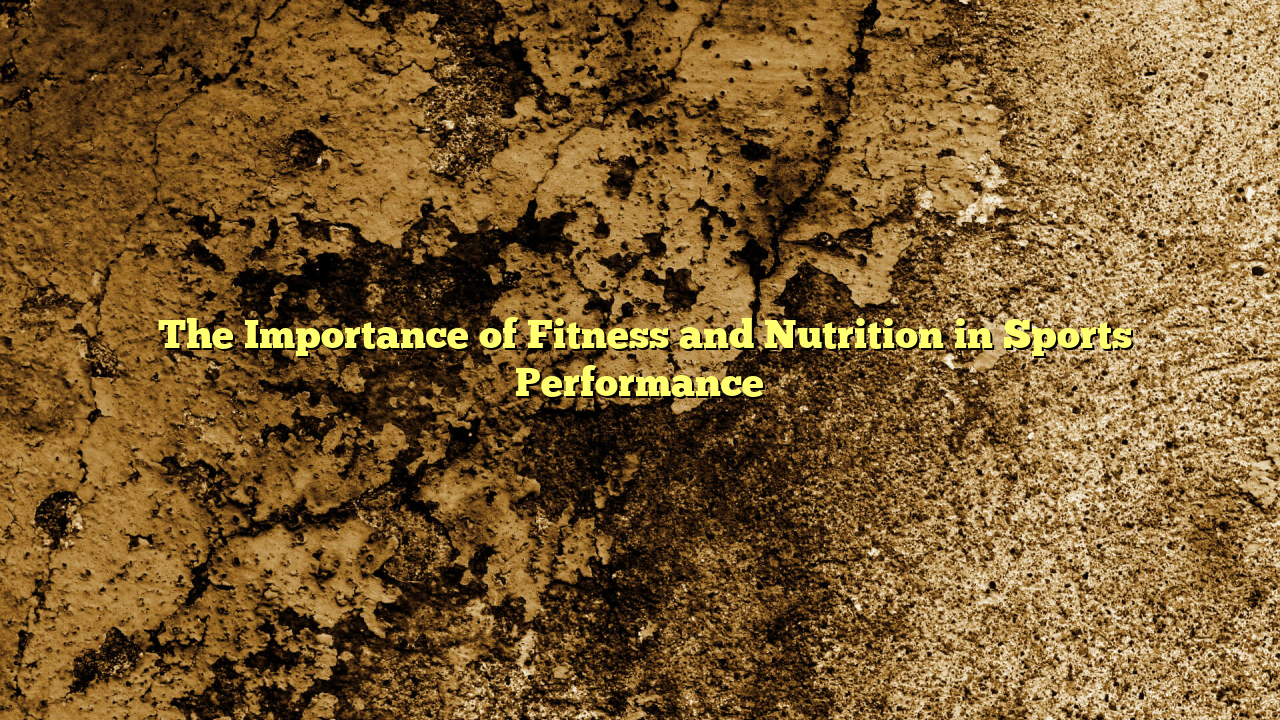Introduction
Athletes train rigorously to achieve peak performance, but training alone is not enough. To compete at the highest level, fitness and nutrition play a crucial role in enhancing endurance, strength, recovery, and injury prevention.
Every professional athlete follows a strict fitness regimen and diet plan tailored to their specific sport. Whether it’s a footballer running for 90 minutes, a sprinter exploding off the starting blocks, or a weightlifter pushing maximum loads, the right balance of exercise and nutrition makes all the difference.
In this article, we explore why fitness and nutrition are essential in sports, the different training methods used by athletes, and the best nutrition strategies for optimal performance.
The Role of Fitness in Sports
Physical fitness is the foundation of an athlete’s success. It consists of several components:
1. Strength and Power
● Strength is vital for athletes in contact sports like football, rugby, and basketball.
● Power, a combination of strength and speed, is crucial for sprinters, jumpers, and weightlifters.
Training Methods:
● Weight Training: Improves muscle strength and endurance.
● Explosive Plyometrics: Increases power and speed.
● Resistance Band Workouts: Helps with flexibility and injury prevention.
2. Endurance and Stamina
● Long-distance runners, cyclists, and swimmers require high levels of endurance.
● Even in sports like football or tennis, endurance helps maintain performance throughout a match.
Training Methods:
● Cardiovascular Training: Running, cycling, and swimming improve lung capacity.
● High-Intensity Interval Training (HIIT): Alternates between short bursts of intense exercise and recovery to enhance stamina.
3. Speed and Agility
● Speed is essential in sports like athletics, football, and basketball.
● Agility, the ability to change direction quickly, is key for tennis, boxing, and martial arts.
Training Methods:
● Sprint Drills: Help improve reaction time and acceleration.
● Ladder Drills and Cone Drills: Enhance footwork and quick movements.
4. Flexibility and Mobility
● Flexibility reduces the risk of injuries and improves movement efficiency.
● Sports like gymnastics, martial arts, and figure skating demand exceptional flexibility.
Training Methods:
● Yoga and Stretching: Increases range of motion and reduces muscle stiffness.
● Dynamic Warm-Ups: Activates muscles before training or competition.
The Role of Nutrition in Sports Performance
Training alone isn’t enough—proper nutrition fuels the body and maximizes performance. Athletes require a balanced diet rich in macronutrients (proteins, carbohydrates, fats) and micronutrients (vitamins and minerals).
1. Carbohydrates: The Primary Energy Source
● Carbs provide the fuel athletes need for endurance and high-intensity activities.
● Sports like football, basketball, and long-distance running depend on carbohydrate stores for sustained energy.
Best Sources of Carbs:
● Whole grains (brown rice, oats, quinoa)
● Fruits (bananas, apples, berries)
● Vegetables (sweet potatoes, spinach)
2. Proteins: Building and Repairing Muscles
● Protein is essential for muscle growth, recovery, and repair.
● Strength athletes, bodybuilders, and sprinters need high protein intake.
Best Sources of Protein:
● Lean meats (chicken, fish, turkey)
● Plant-based proteins (lentils, tofu, beans)
● Dairy (Greek yogurt, cottage cheese)
3. Healthy Fats: Long-Lasting Energy and Recovery
● Fats are important for endurance sports and overall recovery.
● Omega-3 fatty acids help reduce inflammation and promote joint health.
Best Sources of Healthy Fats:
● Nuts and seeds (almonds, walnuts, chia seeds)
● Avocados
● Olive oil and fatty fish (salmon, tuna)
4. Hydration: The Key to Optimal Performance
● Dehydration can cause fatigue, cramps, and poor performance.
● Athletes lose water and electrolytes through sweat, so proper hydration is crucial.
Best Hydration Strategies:
● Drink water consistently throughout the day.
● Electrolyte drinks help replenish sodium and potassium after intense training.
● Coconut water is a natural alternative for rehydration.
5. Pre-Game and Post-Game Nutrition
● Eating the right foods before and after training or competition can boost energy and aid recovery.
Pre- 18hoki :
● Should be rich in carbs for energy and moderate protein for muscle support.
● Example: Whole wheat pasta with chicken and vegetables.
Post-Game Meal:
● Should contain proteins for muscle repair and carbs to replenish glycogen stores.
● Example: Grilled salmon with brown rice and steamed broccoli.
Common Mistakes in Fitness and Nutrition
Even top athletes sometimes make mistakes that affect their performance. Here are some common ones:
1. Overtraining Without Proper Recovery
● Training too much without enough rest leads to fatigue and injuries.
● Solution: Rest days, proper sleep, and active recovery sessions (light jogging, stretching).
2. Ignoring Nutrition
● Many athletes focus only on training and neglect their diet.
● Solution: Follow a meal plan with the right balance of macronutrients.
3. Not Drinking Enough Water
● Dehydration can reduce energy levels and cause cramps.
● Solution: Always stay hydrated before, during, and after exercise.
4. Skipping Warm-Ups and Cool-Downs
● Not preparing the muscles before training increases the risk of injuries.
● Solution: Perform dynamic warm-ups before exercise and static stretching afterward.
Conclusion
Fitness and nutrition are the backbone of athletic performance. A well-planned training routine and balanced diet can enhance an athlete’s endurance, strength, recovery, and overall success.
Every athlete, whether amateur or professional, must focus on consistent workouts, proper nutrition, hydration, and recovery to reach their peak potential. By understanding the connection between fitness and nutrition, athletes can gain an edge over their competition and perform at their best.
The Importance of Fitness and Nutrition in Sports Performance



